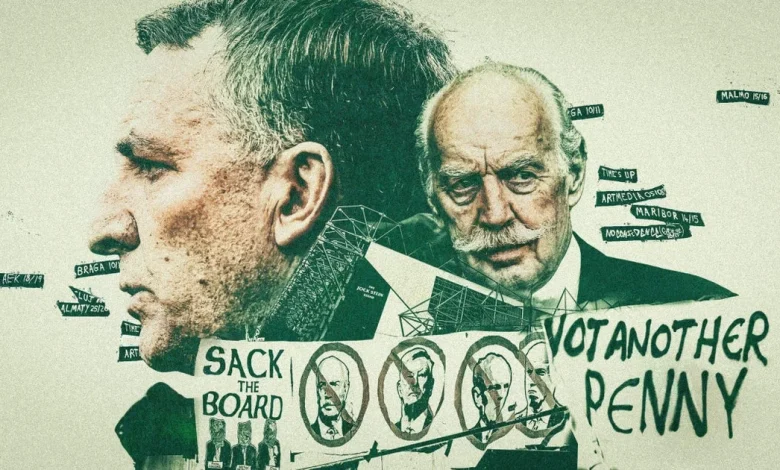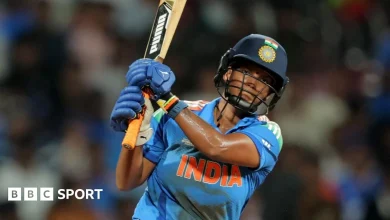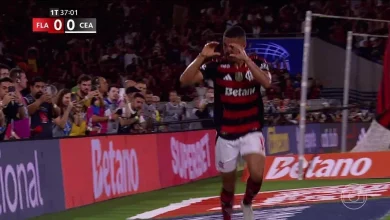How Celtic turned ‘toxic’ – The Athletic

It turns out Brendan Rodgers’ last act as Celtic manager was to deliver a calm assessment of his team’s 3-1 defeat on Sunday afternoon at Tynecastle, home of Heart of Midlothian.
In undramatic language, Rodgers described Celtic’s performance as “bitty” and “lacking in creativity and quality.” He addressed Celtic’s “issues” as “well-documented”. Repeatedly, he said fans and commentators should not be getting carried away with Hearts’ eight-point lead after nine matches. He was not on edge.
“It’s so early,” Rodgers said, “there’s 29 games left.”
This was not a man worried by the possibility of Hearts having a transformational effect on Scottish football, or on him.
But the transformation was coming. Just over 24 hours later, he was gone. There are not 29 league games left for Brendan Rodgers at Celtic this season.
Rodgers resigned. That was a shock in itself, professionally — sports agents do not let their clients resign and thereby give up lucrative pay-offs. Given the unravelling of the relationship over the past three, perhaps nine, months, a mutual separation would have seemed a more logical parting. Rodgers was out of contract in June 2026.
But what followed from leading shareholder Dermot Desmond was even more surprising, an unrestrained and public attack on Rodgers.
Here was dramatic language — “simply untrue”, “absolutely false” were early phrases in a statement from Desmond published on the club’s website that sought to demolish Rodgers’ implication he had not been offered a contract extension this summer. Desmond, 75, an Irish billionaire and key Celtic figure for three decades, who does not speak publicly often, then said Rodgers’ behaviour and comments “contributed to a toxic atmosphere around the club”.
Rodgers watching his team lose at Hearts (Craig Foy/SNS Group via Getty Images)
It was explosive and there was more — “one individual’s desire for self-preservation at the expense of others” — a reference to the fan criticism, verbal and otherwise, that certain Celtic directors have faced recently.
The tone was all the more remarkable because Desmond had previously spoken admiringly of Rodgers’ coaching capabilities and did not harangue him as supporters did when Rodgers abruptly left Celtic for Leicester City in 2019. “Never a Celt, always a fraud”, was a fans’ banner when that happened, and there was general circumspection when Rodgers returned to the club in 2023. But Desmond and the board pressed on, and Rodgers neutralised much of the ill-feeling via silverware. Across his two spells, Celtic won 11 trophies.
But on Monday night, Desmond’s statement concluded: “Celtic is greater than any one person. Our focus now is on restoring harmony, strengthening the squad and continuing to build a club worthy of its values, traditions and supporters.”
To that end, Celtic have returned to their former hero-manager Martin O’Neill, in partnership with former player Shaun Maloney. O’Neill is 73 and first managed Celtic from 2000 to 2005. He brings immediate status and gravitas and, Celtic will hope, some short-term stability. A laconic wit, on Tuesday morning, O’Neill appeared on talkSPORT radio, where he has been working, to say he received a phone call late on Monday afternoon from Desmond and wondered to himself if it was “real or surreal”. Once he had picked himself up “off the floor”, he said yes to a return, but as he said later at a club press conference, he does not see it as a long-term option.
Maloney is 42. He played under O’Neill and has coached Hibernian and Wigan Athletic. He rejoined Celtic as a ‘player pathway’ manager in June and so knows the situation from the inside. During that press conference, he described the scene at the training ground on Tuesday morning as “difficult” and “traumatic”.
Celtic may consider Maloney a contender to succeed Rodgers long-term. Others mentioned are Ange Postecoglou — though it seems unlikely the Celtic manager from 2021 to 2023 would go back. Robbie Keane might be another option, but there are issues there. Keane is managing at Ferencvaros in Hungary. He played briefly on loan for Celtic in 2010, but his previous managerial position at Maccabi Tel Aviv in Israel would be an insurmountable problem for a significant section of the Celtic fanbase whose support for the Palestinian cause is vocal and sincere. Equally, Keane, 45, from Dublin, is well-known to Desmond.
Another Irish manager, Kieran McKenna, who was close to joining Celtic as a boy, would have appeal. Ipswich Town, McKenna’s current club, will be on alert.
Whoever does become Celtic manager will be confronted with two questions: the state of the team and the state of the club.
To those beyond Scotland, this will be puzzling — after all, they have been Scottish champions in 13 of the past 14 seasons and only in February were meeting Bayern Munich in the knockout phase of the Champions League. Alphonso Davies’ added-time equaliser in the second leg gave Bayern a 3-2 aggregate victory. But Celtic had impressed and looked like a progressive squad and club. They felt part of the new Champions League format, and in the absence of domestic challenges, Europe is the yardstick by which the club measures itself.
After that, back in Scotland, Celtic resumed their dominance, winning the title by 17 points from Glasgow rivals Rangers. The Scottish Cup final was lost — in a penalty shootout — to Aberdeen, but as with every club, the expectation internally and externally was that summer 2025 would bring fresh recruitment and Celtic would build on last season. For all the lack of economic strength in the country, Celtic are profitable.
But in early July, Nicolas Kuhn joined Como in Serie A for a fee considerably greater than the £3million they paid for him. Kuhn had scored their goal in Munich and is clearly a high-level player. Having sold striker Kyogo Furuhashi to Rennes in France for £10m in January, Rodgers’ squad had lost two assets.
In August, Celtic were drawn against Kairat Almaty of Kazakhstan in a Champions League qualifier. On paper, it seemed Celtic were destined for another lucrative season in UEFA’s expanded competition. But after two legs, both goalless and poor in quality, Celtic lost another penalty shootout.
The club was disappointed with the associated change in future budgets; fans were furious at the missed opportunity; Rodgers implied the club should have invested more before the two games. Kieran Tierney had gone back to Celtic from Arsenal, and the new midfielder, £2m Benjamin Nygren, also played, but Rodgers’ post-match words were telling: “I always think that investment is great, but it has to be a timely investment.
“It’s very frustrating. We all know where we want to get to. We showed last year the strides that I felt we took. But you have to build on that. The last thing you want to do in football is manufacture your own stress.”
Postecoglou had made a similar remark after an earlier Champions League play-off exit in July 2021: “We haven’t got players in, I obviously haven’t done a good enough job convincing people.”
In the few remaining days of this summer’s transfer window, Celtic acquired Sebastian Tounekti from Hammarby and Michel-Ange Balikwisha from Antwerp, two promising wingers, but centre-forward Adam Idah was sold to Swansea, and free agent Kelechi Iheanacho was his effective replacement. In Rodgers’ vocabulary, Celtic were manufacturing their own attacking stress and, sure enough, they have scored one goal more in the Scottish Premiership than bottom club Livingston.
Following a 2-0 loss at Dundee — Celtic’s first defeat at Dens Park since 1988 — Rodgers provided a soundbite that is likely to have bitten the board, saying if you are “given the keys to a Honda Civic,” you do not “drive it like a Ferrari”.
The players may have felt thrown under a bus by the car analogy. The wheels were coming off, but Rodgers did not reverse. Four days later, Celtic won 2-1 against Sturm Graz in the Europa League — a flattering result against a side reduced to 10 men for the last 20 minutes — but three players were injured. Iheanacho was one and, crucially, Cameron Carter-Vickers was another. Carter-Vickers sustained a late Achilles tendon injury requiring surgery on Monday. He will be out for months.
When Rodgers announced his starting XI for Hearts three days later, Carter-Vickers’ USMNT colleague Auston Trusty remained on the bench. Celtic academy graduate Dane Murray was selected. Murray scored an unfortunate own goal after eight minutes to send Hearts on their way.
On the final whistle, the Celtic players and Rodgers gathered to offer meek appreciation to the travelling fans, whose response was not laudatory. Those fans had four individual banners featuring four directors with hazardous warning symbols surrounding each face, Desmond’s being one of them. There are a lot of Celtic supporters who no longer like the club they love.
Maloney (left) and O’Neill (right) at the press conference on Tuesday (Jeff J Mitchell/Getty Images)
‘Zero ambition’ is another banner seen in Celtic away ends. Because as matters deteriorated on the pitch, off it, the famously loyal and loud Celtic support grew frustrated with money spent and not spent, signings made and not made, boardroom silence and a growing political and cultural divide. At Kilmarnock last month, Celtic supporters turned up 12 minutes late in protest to signify the symbolic 12th man. Against Hibs, they refused to sing for a period, and at Dundee, play was interrupted by balls and oranges being thrown onto the playing surface.
The board tried to counter rising antagonism with a lengthy statement, which included: “We can never compromise the financial integrity of the club”. But many had given up listening. The toxicity has been scorching.
In the middle of this are the players, some more experienced and tougher than others, plus games and, until Monday, Rodgers.
Asked at Hearts on Sunday if the tumult around the club affected him, Rodgers replied, “day to day it doesn’t have any impact,” though he added there must be many studies showing “the impact of disharmony”.
Ultimately, the impact was Monday’s implosion, Rodgers’ departure, Desmond’s missile and O’Neill and Maloney at Parkhead stadium on Tuesday. On Wednesday night, they will be back: Celtic play Falkirk in the league. The reaction will intrigue Celtic-watchers.
There is then a Scottish League Cup semi-final against Rangers at Hampden Park on Sunday. Rangers, of course, are as unhappy as Celtic and have also changed their manager before November amid fan furore.
Few cities gulp down football like Glasgow. There’s a lot of hard swallowing going on.





